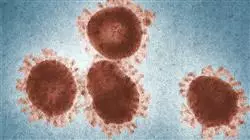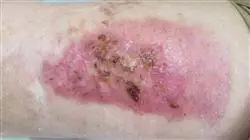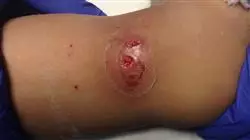University certificate
The world's largest faculty of pharmacy”
Why study at TECH?
With this Postgraduate certificate, you have the opportunity to update your knowledge in a comfortable way and without renouncing the highest scientific standards, to incorporate the latest advances in the approach to infectious pathology in your daily pharmaceutical practice"

Infectious diseases remain the leading cause of mortality and disability (loss of productive life years) in the world. In 2016, of the total 56.4 million deaths worldwide, 33% were due to infectious diseases, 30% to cardiovascular diseases and 10% to cancer. The fight against disease will have two simultaneous fronts: infectious diseases and chronic non-communicable diseases.
Among the 17.3 million people who died from infections in 2016, the most frequent causes of death were lower respiratory infections (3.7 million), malaria (2.2 million), tuberculosis (1.3 million), diarrhea (1.4 million), and HIV/AIDS infection (1.1 million). The most important factors to take into consideration in relation to infectious diseases are demographics and human behavior, technological and industrial development, economic development and variations in land use, intercontinental travelling and commerce, climate change, microbiotic adaptation and finally the disapperance or reduction of efficient public health measures.
These factors, interacting with each other, have conditioned that we should not consider any part of the planet reasonably isolated from the rest, nor impossible the appearance, reappearance or dissemination of imported or apparently eradicated infectious diseases in our environment.
Seize the moment and gain up-to-date knowledge on the management of coronavirus infections."
This Postgraduate certificate in Diagnosis and Treatment of Infections Caused by Bacteria contains the most complete and up-to-date program on the market. The most important features of the program include:
- Clinical cases presented by experts in Diagnosis and Treatment of Infections Caused by Bacteria
- The graphic, schematic, and practical contents with which they are created provide scientific and practical information on the disciplines that are essential for professional practice
- New developments on Diagnosis and Treatment of Infections Caused by Bacteria
- Practical exercises where self-assessment can be used to improve learning
- An algorithm-based interactive learning system for decision-making in the clinical situations presented throughout the course
- Theoretical lessons, questions to the expert, debate forums on controversial topics, and individual reflection assignments
- Content that is accessible from any fixed or portable device with an Internet connection
This Postgraduate certificate is the best investment you can make in a qualification for two reasons: you will obtain a Postgraduate certificate from the largest digital university in Spain, TECH, and you will acquire the best and most up-to-date education in Diagnosis and Treatment of Infections Caused by Bacteria"
Its faculty is made up of prestigious and renowned professionals, with a long history in health care, teaching and research, who have worked in many countries on several continents, developing a professional and teaching experience that they deliver in an extraordinary way in this program.
The methodological design of this program, developed by a multidisciplinary team of e-learning experts, integrates the latest advances in educational technology for the creation of numerous multimedia educational tools that allow the professional, based primarily on the problem-solving method, to face the solution of real problems in their daily clinical practice, which will allow them to progress in the acquisition of knowledge and the development of skills that will impact their future professional work.
It should be noted in this program that all of the contents generated, as well as the videos, self-evaluations, clinical cases and exams have been thoroughly reviewed, updated, and integrated by the teachers and the team of experts that make up the working group, to facilitate the learning process with a step-by-step approach in order to achieve the teaching program objectives.
This program, recently updated due to the global pandemic situation, is the best in the educational landscape for viral infections”

Don't miss the opportunity and get up to date on advances in the treatment of the infections to incorporate them into your daily medical practice”
Syllabus
The educational program has been created by a group of professors and professionals in pharmacy and medicine, from various medical specialties, with extensive research and teaching experience in several countries in Africa, Central and South America, interested in integrating the latest and most current scientific knowledge of clinical infectology and antimicrobial therapeutics to ensure training and professional development to improve the daily clinical practice of professionals who care for patients or populations with infectious diseases.

This Postgraduate certificate in Diagnosis and Treatment of Infections Caused by Bacteria contains the most complete and up-to-date program on the market”
Module 1. Bacterial Diseases and Antimicrobials
1.1. Principles of Bacteriology
1.1.1. Fundamental Concepts of Use in Bacteriology
1.1.2. Main Gram-Positive Bacteria and their Diseases
1.1.3. Main Gram-Negative Bacteria and their Diseases
1.2. Bacterial Skin Infections
1.2.1. Folliculitis
1.2.2. Furunculosis
1.2.3. Anthrax
1.2.4. Superficial Abscesses
1.2.5. Erysipelas
1.3. Community-Acquired Pneumonia (CAP)
1.3.1. Epidemiology
1.3.2. Etiology
1.3.3. Clinical Picture
1.3.4. Diagnosis
1.3.5. Prognosis Scales
1.3.6. Treatment
1.4. TB
1.4.1. Epidemiology
1.4.2. Etiopathogenesis
1.4.3. Clinical Manifestations
1.4.4. Classification
1.4.5. Diagnosis
1.4.6. Treatment
1.5. Infections of Urinary Tract and Gynecologic Infections in Women
1.5.1. Classification
1.5.2. Etiology
1.5.3. Clinical Picture
1.5.4. Diagnosis
1.5.5. Treatment
1.6. Bacterial Meningitis
1.6.1. Immunology of the Subarachnoid Space
1.6.2. Etiology
1.6.3. Clinical Picture and Complications
1.6.4. Diagnosis
1.6.5. Treatment
1.7. Osteoarticular Infections
1.7.1. Septic Arthritis
1.7.2. Osteomyelitis
1.7.3. Infectious Myositis
1.8. Enteric and Intra-Abdominal Infections
1.8.1. Acute Gastroenteritis.
1.8.2. Acute Enterocolitis
1.8.3. Primary Peritonitis
1.8.4. Secondary Peritonitis
1.9. Zoonotic
1.9.1. Concept
1.9.2. Epidemiology
1.9.3. Main Zoonotic Diseases
1.9.4. Leptospirosis.
1.10. Antibacterials
1.10.1. General Concepts
1.10.2. Classification
1.10.3. Mechanisms of Action for Antimicrobials
1.11. Betalactams: Penicillins and Betalactamase Inhibitors
1.11.1. Structure of the Beta-Lactam Ring
1.11.2. Penicillins: Classification, Mechanisms of Action, Antimicrobial Spectrum, Pharmacokinetics, Pharmacodynamics, Dosage and Presentation
1.11.3. Beta-lactamases: Types and Action on Beta-Lactam Antibiotics
1.11.4. Main Beta-Lactamase Inhibitors
1.11.5. Uses and Therapeutic Indicators
1.11.6. Cephalosporins
1.11.7. Monobactams
1.11.8. Carbapenemics
1.12. Aminoglycosides, Tetracyclines and Cliopeptides
1.12.1. Aminoglycosides: Classification, Mechanisms of Action, Antimicrobial Spectrum, Pharmacokinetics, Pharmacodynamics, Dosage and Presentation
1.12.2. Tetracyclines: Classification, Mechanisms of Action, Antimicrobial Spectrum, Pharmacokinetics, Pharmacodynamics, Dosage and Presentation
1.12.3. Glycopeptides: Classification, Mechanisms of Action, Antimicrobial Spectrum, Pharmacokinetics, Pharmacodynamics, Dosage and Presentation
1.13. Lincosamines, Rifampicins, Antifolates
1.13.1. Lincosamines: Classification, Mechanisms of Action, Antimicrobial Spectrum, Pharmacokinetics, Pharmacodynamics, Dosage and Presentation
1.13.2. Rifampicin: Classification, Mechanisms of Action, Antimicrobial Spectrum, Pharmacokinetics, Pharmacodynamics, Dosage and Presentation
1.13.3. Antifolates: Classification, Mechanisms of Action, Antimicrobial Spectrum, Pharmacokinetics, Pharmacodynamics, Dosage and Presentation
1.14. Quinolones, Macrolides and Ketolides
1.14.1. Quinolones: Classification, Mechanisms of Action, Antimicrobial Spectrum, Pharmacokinetics, Pharmacodynamics, Dosage and Presentation
1.14.2. Macrolides: Classification, Mechanisms of Action, Antimicrobial Spectrum, Pharmacokinetics, Pharmacodynamics, Dosage and Presentation
1.14.3. Ketolides: Classification, Mechanisms of Action, Antimicrobial Spectrum, Pharmacokinetics, Pharmacodynamics, Dosage and Presentation
1.15. New Antibiotics for Gram-Positive Infections (Lipopeptides and Oxazolidinones)
1.15.1. Lipopeptides
1.15.2. Oxazolidinones

A unique, key, and decisive experience to boost your professional development”
Postgraduate Certificate in Diagnosis and Treatment of Infections Caused by Bacteria
If you are a health professional and wish to update your knowledge in the diagnosis and treatment of infections caused by bacteria, we present you the "Postgraduate Certificate in Diagnosis and Treatment of Infections Caused by Bacteria", with a high scientific rigor, which will give you the opportunity to learn the latest techniques and developments in the field. The Postgraduate Certificate is designed in a comprehensive manner, and is taught by professionals with years of experience in the sector, which guarantees the quality of the curriculum.The diagnosis and treatment of infections caused by bacteria is a highly demanded specialty in the health sector. For this reason, the "Postgraduate Certificate in Diagnosis and Treatment of Infections Caused by Bacteria" is a unique opportunity to specialize in this area, and improve your skills in the diagnosis and treatment of these pathologies.During the course, you will have access to updated training, ranging from the most theoretical aspects to the most practical and advanced procedures. All this, with the aim of providing you with a complete update that will allow you to successfully address any case of bacterial infections that arise in your clinical practice.
Update your knowledge in infectious diseases
In addition, the methodology of the course is based on the combination of theoretical and practical classes, which will allow you to apply the knowledge acquired in real situations and thus improve your diagnostic and therapeutic skills. At the end of the "Postgraduate Certificate in Diagnosis and Treatment of Infections Caused by Bacteria", you will have specialized knowledge and a solid theoretical and practical basis for the care of patients with these pathologies. Don't miss the opportunity to specialize in one of the areas with the highest demand for professionals in the health sector, enroll today!







